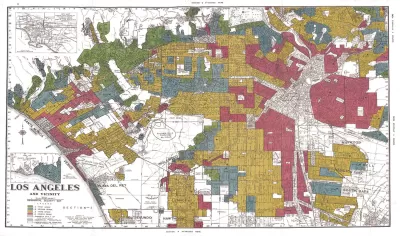New research and mapping projects reveal how the deeply embedded racism of planning and housing policies of the past are connected to the growing wealth gap of the present.

Mathew Leger provides insight into the widening wealth gap in the United States, with recent research connecting housing inequality to wealth inequality.
As Leger notes, past research has usually listed the following factors as the primary drivers of wealth inequality:
- Declining tax progressivity
- Technological advances
- Decline in union membership
- Decline in real value of the minimum wage, and
- Globalization
Recent studies by researchers at MIT, the University of Illinois, and the University of Michigan, however, "suggest that housing inequality is the leading cause of wealth inequality," according to Leger.
Further supplementing that point, Leger also shares word of a mapping project called "Mapping Prejudice," which visualizes the spread of racial covenants (i.e., property deeds excluding racial minorities from owning or occupying property) and redlining around Minneapolis during the 20 century.
Leger concludes by raising the possibility, and ongoing, question of whether the highly lauded Minneapolis 2040 comprehensive plan could achieve its ambitions of overcoming the racist history of property rights discrimination in the city.
FULL STORY: Map Monday: Ending Discrimination in Minneapolis Housing

Alabama: Trump Terminates Settlements for Black Communities Harmed By Raw Sewage
Trump deemed the landmark civil rights agreement “illegal DEI and environmental justice policy.”

Planetizen Federal Action Tracker
A weekly monitor of how Trump’s orders and actions are impacting planners and planning in America.

The 120 Year Old Tiny Home Villages That Sheltered San Francisco’s Earthquake Refugees
More than a century ago, San Francisco mobilized to house thousands of residents displaced by the 1906 earthquake. Could their strategy offer a model for the present?

In Both Crashes and Crime, Public Transportation is Far Safer than Driving
Contrary to popular assumptions, public transportation has far lower crash and crime rates than automobile travel. For safer communities, improve and encourage transit travel.

Report: Zoning Reforms Should Complement Nashville’s Ambitious Transit Plan
Without reform, restrictive zoning codes will limit the impact of the city’s planned transit expansion and could exclude some of the residents who depend on transit the most.

Judge Orders Release of Frozen IRA, IIJA Funding
The decision is a victory for environmental groups who charged that freezing funds for critical infrastructure and disaster response programs caused “real and irreparable harm” to communities.
Urban Design for Planners 1: Software Tools
This six-course series explores essential urban design concepts using open source software and equips planners with the tools they need to participate fully in the urban design process.
Planning for Universal Design
Learn the tools for implementing Universal Design in planning regulations.
Clanton & Associates, Inc.
Jessamine County Fiscal Court
Institute for Housing and Urban Development Studies (IHS)
City of Grandview
Harvard GSD Executive Education
Toledo-Lucas County Plan Commissions
Salt Lake City
NYU Wagner Graduate School of Public Service





























